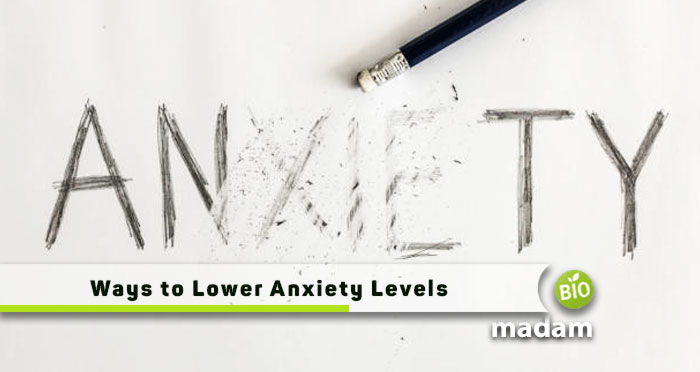Anxiety is a mental health condition characterized by feelings of worry, fear, and unease that can be mild or severe. Everyone experiences anxiety at some point in life, but it can interfere with daily activities when it becomes chronic or overwhelming. If you’re struggling with anxiety, there are several things you can do to help lower your levels of anxiety and improve your quality of life. Let’s learn how!
Get Regular Exercise
It can also help you sleep better, which can decrease anxiety levels. Aim for 30 minutes of moderate-intensity aerobic exercise most days of the week. If you’re starting, you may need to build up to this amount gradually.
A workout schedule can help you manage your anxiety by providing structure and routine to your week. It can also help you set aside time each week to focus on your physical health, reducing stress and improving your mood. When creating a workout schedule, include various activities that you enjoy and are appropriate for your fitness level.
Try Cannabidiol Products
Cannabidiol (CBD) is a compound found in the cannabis plant. Unlike THC, CBD does not produce psychoactive effects. However, it has provided various health benefits, including reducing anxiety. CBD products are available in many forms, such as oils, tinctures, capsules, and edibles.

If you’re interested in trying CBD to lower your anxiety levels, it’s essential to choose a product that is high quality and from a reputable source. When planning to buy online, target a store that is diverse in its products. Sometimes comparing various full spectrum CBD oil products helps in decision-making. It would be best if you also ascertained that the quality is good. Be sure to start with a low dose and increase gradually as needed.
Don’t Skip Meals
When you’re anxious, it’s tempting to skip meals or go for long periods without eating. However, this can make anxiety worse. Make sure to eat three balanced meals daily and avoid skipping any meals. If you’re not hungry at mealtimes, try eating healthy foods throughout the day.
At the same time, eat nutritious meals that would benefit your health. This will help you not only physically but also mentally and emotionally. Some foods that may help to lower anxiety levels include:
- Omega-3 fatty acids. These healthy fats are found in cold-water fish, such as salmon, tuna, sardines, flaxseeds, chia seeds, and hemp seeds. You can also take omega-3 supplements.
- Probiotics are live, good bacteria found in yogurt and other fermented foods and supplements. Probiotics may help to reduce anxiety by improving the balance of bacteria in the gut.
- Magnesium-rich foods include leafy greens, nuts, seeds, and whole grains. Magnesium is a mineral involved in many body processes, including muscle and nerve function.
- Herbal teas, such as chamomile tea, lemon balm tea, and lavender tea, have been used for centuries to help reduce stress and anxiety.
Limit Caffeine and Alcohol
These two are stimulants that can increase anxiety levels. If you’re struggling with anxiety, limiting your intake of these substances is essential. Aim to drink no more than two cups of coffee per day, and limit alcoholic beverages to two drinks per day for men and one for women.
If you have a problem with addiction, it’s crucial to get help from a professional. Addiction can worsen anxiety and lead to other mental health issues. Find centers near you that can help with addiction.
Get Enough Sleep
You may have trouble falling asleep or staying asleep when you’re anxious. This can lead to fatigue, which can make anxiety worse. Aim to get 7-8 hours of sleep each night by going to bed and waking up at the same time each day, avoiding caffeine and alcohol before bed, and creating a relaxing bedtime routine.
Stick to your best sleep habits, like avoiding caffeine and alcohol before bed, to ensure you’re getting enough rest. At the same time, avoid heavy eating before bedtime, as this can make it harder to sleep.
Talk to a Therapist
A therapist can help you understand and manage your anxiety and provide support and guidance. If you’re unsure how to find a therapist, ask your doctor for a referral. These experts will help you understand your anxiety and how to manage it. It is best to find one you feel comfortable talking to so that you can be open about what you’re experiencing.
Share with Others

If your anxiety is severe, interfering with your life, or showing physical symptoms, it’s essential to talk to someone about it. A therapist can help you understand and manage your anxiety. They can also provide support and guidance. Don’t be afraid to reach out for help if you’re struggling.
Keep the right company of people who would listen to you and understand what you’re going through. These people will help you feel better and be more positive.
Many healthy ways might help lower your anxiety levels. Try incorporating some of these tips into your daily routine, and see how they work. Remember to talk to a therapist if your anxiety is severe like you start shaking or if it is interfering with your life.

Hi, they call me Jenna, and I am also known for achieving a gold medal during my Ph.D. in science life. I always had a dream to educate people through my utmost writing hobby. So, I chose this blogging path, and Biomadam gave me this opportunity to present for them. I now stand to entertain you. Continue reading my articles & discuss if you’ve any confusion through the comment section below.

